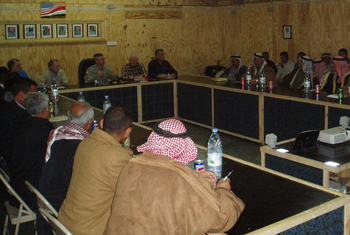



| Iraqi fish farmers discuss future of industry |

|

|
| دفتر روابط عمومی لشگر پیادهنظام سوم، هنگ جنگی چهارم | |
 Lt. Col. Timothy Newsomewelcoms attendees to the initial meeting for rebuilding the fish farming industry in North Babil Feb. 17. (U.S. Army courtesy photo) FOB KALSU, Iraq (Feb. 26, 2008) — Thirty-one fish farm owners interested in rebuilding the fish farming industry in North Babil, Iraq, met with various organization representatives Feb. 17 at FOB Iskan. The meeting was hosted by 3rd Battalion, 7th Infantry Regiment, 4th Brigade Combat Team, 3rd Infantry Division, and led by George Stickels from 4th BCT’s embedded Provincial Reconstruction Team. Other organizations represented at the meeting were IMNA (which means growth in Arabic) and the United States Agency for International Development. “A lot of moving parts go toward making these fish farms work,” said Capt. Jim Hart, commander of Company B, 3-7th Inf. Regt. “I think after this meeting we’ll all have a good idea of some solutions for helping the local economy get back on its feet.” Discussed in the meeting was what local fish farms need to succeed economically. Several issues hindering the fish farms from operating were brought up. The first one was security, but everyone acknowledged that it is improving daily. The second issue was canal maintenance. Over the years of violence, the fish farms have become overgrown with weeds and silt, causing drainage and water circulation problems throughout the interconnected fish farms. Other issues discussed included the availability of certain types of fish, transportation of fish to markets in large communities, the cost of fish feed, water pumps, pollution produced by power plants and the import of cheap fish from Iran, which undermines the Iraqi fish farm economy. Hart said Company B, 3-7th Inf. Regt. will continue to clear the fish farms and provide a secure and safe environment for follow-on agricultural work. They will also continue to collect data on owners and operating capacities of existing fish farms and work to use Commander's Emergency Response Program funds and microgrants to help solve some of the canal and water circulation issues in the area. IMNA will continue to collect data and submit a proposal and plan for the fish farm reconstruction efforts. A meeting is scheduled for next month to gauge progress made on the issues brought up during the initial meeting. |
| < بعد | قبل > |
|---|

آخرین اطلاعات درباره فرماندهی مرکزی را با ایمیل دریافت کنید.
















